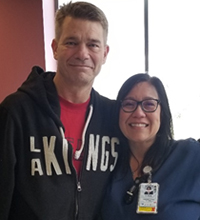Groundbreaking investigational therapies, collaborative studies are changing the fight
07/02/2019
Many generous donors choose to help in the pursuit of tomorrow's cures by supporting research with their gifts to the Banner Health Foundation. Among the most promising areas of research supported by these gifts is the clinical trials program at Banner MD Anderson Cancer Center.
Since its inception, the Clinical Trials Division at Banner MD Anderson has opened over 190 research studies with over 680 patients participating in research.
 |
|
|
DARIN JOHNSON With a diagnosis of diffuse large B-cell lymphoma, Darin had no good treatment options when he participated in two clinical trials at Banner MD Anderson. Crediting his support staff with keeping him positive, Darin found hope that there were people watching out for him. “It was nice to know that when standard treatment doesn’t help, there are still other options,” Darin said. “And the options for me have worked really well.” Now in remission, Darin reports that “the best part about being on a clinical trial was the thought of being on the frontline, and that you could be helping someone else.” |
Clinical trials at Banner MD Anderson range from treatment studies using groundbreaking investigational therapies to lab-based and cancer-prevention studies analyzing various components to learn more about how to recognize and effectively manage different types of cancer. Many of the clinical studies are done in collaboration with MD Anderson Cancer Center in Houston, TX.
Investigational therapies at Banner MD Anderson
Immunotherapy
Immunotherapies use the body’s own immune system to fight cancer cells by either stimulating the immune system or by giving the immune system components to attack the cancer cells specifically. This has led to an entirely new class of drugs and brought lasting remission to many patients who had run out of options.
Currently, over 60% of the clinical trials at Banner MD Anderson have immunotherapy components where the immunotherapies are used either alone or in combination with other anti-cancer treatments.
Cellular Therapy
CAR T-cell immunotherapy uses a patient’s own white blood cells which have been genetically reprogrammed in the lab to fight their own cancer cells.
 |
|
|
RAYMOND DINNEN “I had never been sick a day in my life. Not ever," Raymond says. "When I was diagnosed with stage 3 colon cancer, ‘fear’ was an understatement.” From his team of doctors, nurses, a research coordinator, and infusion experts, Raymond received immediate reassurance, followed by consistent support through the rest of his experience with Banner MD Anderson. Raymond's decision to participate in the clinical trial was further reinforced when "Yes!" was the answer to his only question: Could this help others? Raymond is pictured above with his infusion nurse on the day he “rang the bell” after his last treatment. |
CAR T-cell therapy was named the Advance of the Year by American Society of Clinical Oncology in 2018 and so far, two CAR T-cell therapies have been FDA approved to treat patients with hematologic malignancies, with several other indications still under investigation.
Banner MD Anderson’s Clinical Trials Division is participating in nine CAR T-cell studies for a variety of blood and lymphoid cancers and is now looking to open expand cellular therapy studies to other types of cancer.
The medical center was the first site in Arizona to offer treatment with CAR T-cell therapy through its clinical trial. This pivotal study led to FDA approval of axicabtagene ciluleucel in 2017 and Banner MD Anderson became the first cancer center in Arizona approved to treat patients with CAR T-cell therapy as a standard of care, following FDA approval.
Oncolytic virus therapy
Viruses, like the flu, function by infecting cells and replicating inside of the cell. Similar to these viruses, oncolytic viruses infect cancer cells and make copies of itself until the cell bursts. The dying cancer cell releases materials that allow the cancer to be recognized by the immune system and promote other anti-tumor immune system responses. Banner MD Anderson has clinical trials using oncolytic virus therapy for bladder cancer, prostate cancer, and a variety of other solid tumor cancers.
Investigational Cancer Therapeutics Unit
The number of cancer patients participating in clinical trials at Banner MD Anderson tripled since 2016, mostly due to a dedicated research operations team and a growing number of physician investigators looking to provide patients access to the most scientifically promising treatment options.
| GIVE TO CANCER PROGRAMS |
Patients receiving investigational products require special procedures and close monitoring. An Investigational Cancer Therapeutics Unit gives research participants the special care and attention they deserve in a safe and caring place, resulting in:
- Expanded clinical trial capacity, providing more patients access to leading-edge therapies.
- Reduced wait times to allow for additional care needed to monitor those patients treated with investigational therapies.
- Specialized staff trained specifically to support investigational cancer therapies.

